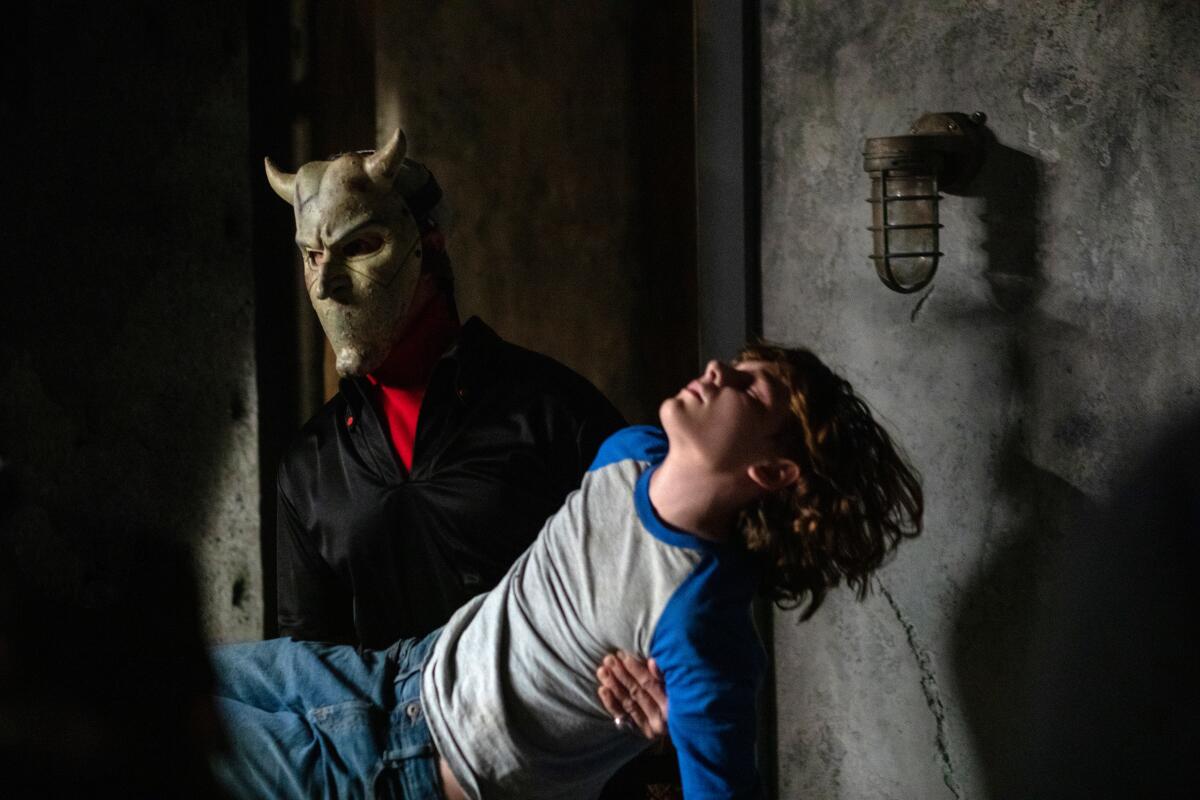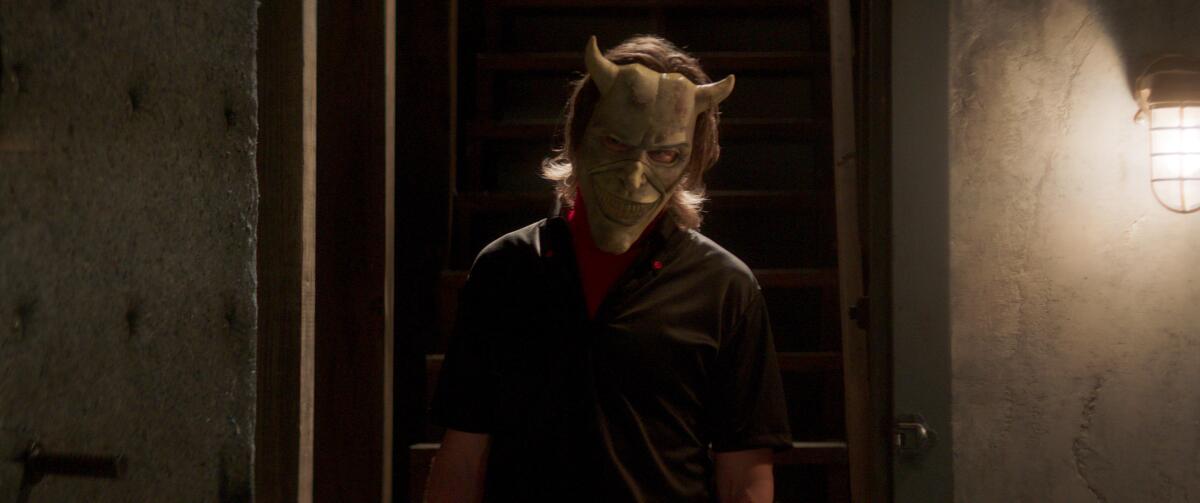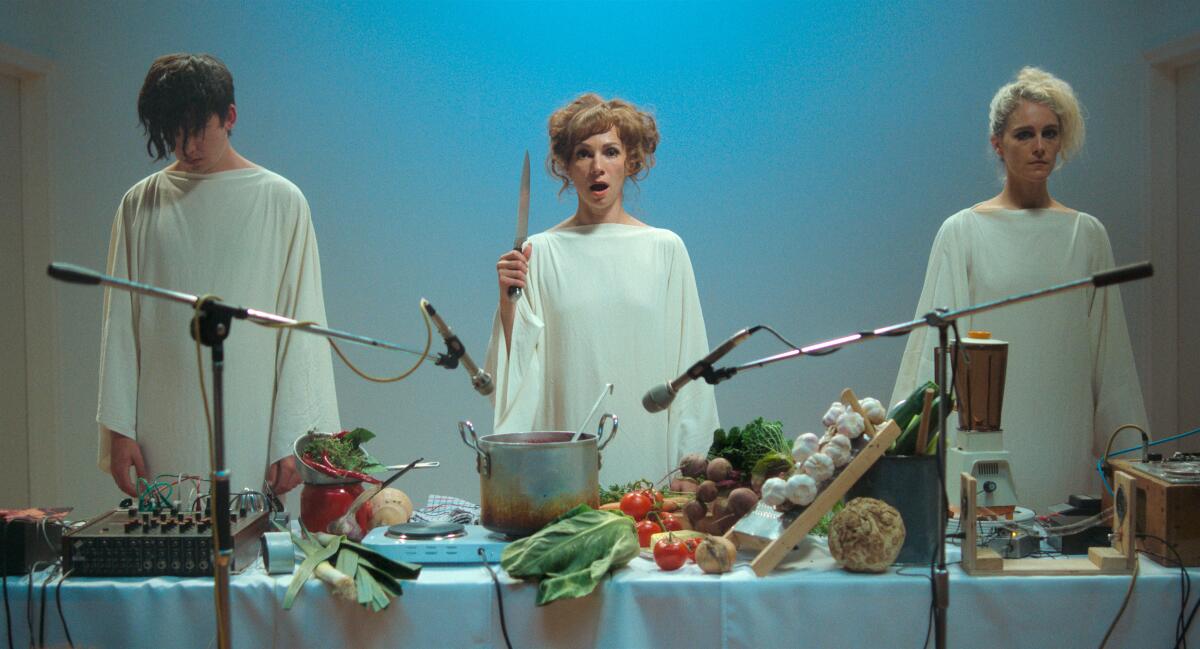Grungy horror calls in ‘The Black Phone’

- Share via
Hello! I’m Mark Olsen. Welcome to another edition of your regular field guide to a world of Only Good Movies.
Only good movies
Get the Indie Focus newsletter, Mark Olsen's weekly guide to the world of cinema.
You may occasionally receive promotional content from the Los Angeles Times.
This is obviously a day when it is difficult to focus on something like the movies, but at their core they are a reflection of our world and a way to grab hold of something when it seems everything is spinning out of control.
Elvis is back. I make no secret that I am a huge fan of Elvis Presley and think of him often, so I have been very excited for the arrival of Baz Luhrmann’s lavish new biopic, “Elvis.” In her review for Tribune News Service, Katie Walsh wrote, “Luhrmann takes Presley’s legacy, relegated to a Las Vegas gag, and reminds us just how dangerous, sexy and downright revolutionary he once was. He makes Elvis relevant again.”
Jen Yamato spoke to Austin Butler, Luhrmann and Priscilla Presley about Butler’s performance in the title role. On what he took away from spending so much time immersed in the life and work of Elvis, Butler said, “The times in which he stayed true to himself, there’s a lot for me to learn in that because so many people have opinions and ideas about what you should be doing or who you should be or how you should look.”
Butler added, “I think that the lesson in there for me is to try to really turn up the volume of my own intuition and ask myself what I really want to do.”
“Lost Highway” is found again. We are also big fans of filmmaker David Lynch in these parts, and so it is very exciting to see his 1997 film “Lost Highway” return to theaters in a new 4K restoration, playing locally at Landmark’s Nuart Theatre. The film is a fractured noir thriller anchored by Bill Pullman and Patricia Arquette with a particularly disquieting performance from Robert Blake.
In Kenneth Turan’s original review of the film, he wrote, “The result is one weirded-out movie that plays as if it were coming and going at the same time. Though ‘Lost Highway’ presents enough traditional mysteries to mimic the shape of something that might make sense, it has no intention of offering anything like solutions. This film answers no questions, solves no riddles and treats questions of traditional logic as if they came from a different universe.”
Sofia Coppola receives a tribute. The American Cinematheque will present “Sofia Coppola: Forever Young,” a two-night tribute to the filmmaker next week, including screenings of her films “The Bling Ring” and “The Virgin Suicides,” along with two films that influenced her, “To Die For” and “Picnic at Hanging Rock.”
There will also be introductions to the films by Hannah Strong, who recently published the excellent (and extremely good-looking) survey of Coppola’s career, “Sofia Coppola: Forever Young,” as part of the same series of books as Adam Nayman’s entries on Joel and Ethan Coen, Paul Thomas Anderson and David Fincher. Strong will be signing her book as well.
Gillian Anderson is on “The Envelope.” This week on “The Envelope” podcast, I spoke to the actor about her recent roles on “The First Lady,” “Sex Education” and “The Great.” (And, yes, “The X-Files” comes up too.) One thing that seems to connect her roles is that she is often playing women who are a bit ahead of their time, living life on their own terms. As Anderson said, “I don’t think I’ve ever stayed in my lane figuratively and literally.… In terms of career, if I had done what other people said, I probably wouldn’t have ended up in the U.K., probably wouldn’t have started doing theater right off the bat of doing ‘The X-Files’ and probably would have gotten a publicist and all those things. So, sometimes it’s OK and one can still succeed even if you don’t toe the party line.”
Enjoying this newsletter? Consider subscribing to the Los Angeles Times
Your support helps us deliver the news that matters most. Become a subscriber.
‘The Black Phone’
Directed by Scott Derrickson with a script that Derrickson and C. Robert Cargill adapted from a short story by Joe Hill (Stephen King’s son), “The Black Phone” is a startlingly grim horror-thriller set in Denver in the late 1970s. A man known only as the Grabber terrorizes the city with a series of child abductions, eventually snatching Mason Thames (Finney Shaw) and locking him away in a basement where a disconnected phone seems to connect to the otherworldly. The film is in theaters now.
For Tribune News Service, Katie Walsh wrote, “Desaturated color and grainy, dreamlike sections bring a vintage feel to the film’s style, and even the fear of a child kidnapper feels appropriately retro. The period setting doesn’t seem to be trying to comment on current events — it’s almost as if the film is nostalgic for simpler times when the greatest worry for a child was a creepy guy with a van and a soundproofed basement rather than the larger existential threats of climate change and mass shootings. At least it seems like there’s a way out of the Grabber’s clutches, and the larger message of ‘The Black Phone’ is in that perseverance, standing up to the biggest bully of them all. It’s a positively quaint moral at the center of a shockingly violent and scary movie.”
Sonaiya Kelley spoke to Derrickson and Cargill for a story that will be publishing soon about what they called the film’s “reverse Amblin aesthetic.” As Derrickson put it, “Childhood is traumatic for everybody in some form, no matter where you’re from. It’s hard to be a kid. I liked the idea that the Grabber was a kind of hyperinflation of what they were already living [through].... I think the value of the narrative is this overcoming of this larger evil which strengthens and enables this main character to return to the evils that he faces on a day-to-day basis. I felt like that in itself would have a kind of understated power and meaning.”
For the New York Times, Jeannette Catsoulis wrote, “More touching than terrifying, Scott Derrickson’s ‘The Black Phone’ is less a horror movie than a coming-of-age ghost story. In place of gouting gore and surging fright, this enjoyable adaptation of Joe Hill’s 2005 short story has an almost contemplative tone, one that drains its familiar horror tropes — a masked psychopath, communications from beyond the grave — of much of their chill.”
For Entertainment Weekly, Leah Greenblatt wrote, “Hawke’s mere malevolent presence is often the freakiest thing on screen. His nose and mouth concealed by a series of leering, goat-horned masks and his motives unclear, the actor swings between breezy benevolence and sputtering rage; there’s a game he wants to play, except the rules aren’t written anywhere.… Thames, with his fox-like face and watchful eyes, feels more like a real kid than Hollywood usually allows, and even as goofier gaps begin to appear in the storyline, his MacGyver-like resourcefulness give the movie a witty, furious kick: ‘Home Alone’ for the Blumhouse crowd.”

‘Flux Gourmet’
Peter Strickland (“In Fabric”), the writer and director who has become one of the world’s leading purveyors of delightfully strange genre pastiche, returns with “Flux Gourmet.” In the film, a group of performance artists (Fatima Mohamed, Ariane Labed and Asa Butterfield) who work with sound and food take up residency at an art institute run by an eccentric woman (Gwendoline Christie), and tensions boil over. The film is in limited release and available on VOD.
For The Times, Justin Chang wrote, “If this is satire, it’s satire so generously attentive toward its targets that mockery and love become virtually indistinguishable.… A fetishist par excellence, Strickland likes to dwell on surfaces and textures, and in ‘Flux Gourmet’ he offers up an aural and visual feast in which food itself is relentlessly scrutinized and even defamiliarized. In one scene, he shoots an enormous bread spread in such disorienting close-up that the rolls and pastries come to resemble alien organs. In another, he considers the illusory properties of a certain dessert. It’s all in terrible taste. It’s also delicious.”
For the New York Times, A.O. Scott wrote that the film becomes “an elegant fugue of contrapuntal themes: grossness and refinement; pleasure and disgust; appetite and discipline. The film isn’t so much an allegory or fantasy as a witty philosophical speculation on some elemental human issues. We are animals driven by lust, hunger and aggression, but also delicate creatures in love with beauty and abstraction. Those two sides of our nature collide in unexpected, infinitely variable ways.”
For the Hollywood Reporter, Leslie Felperin wrote, “Perhaps it’s a sign that this is one of Strickland’s weaker works when you’re reduced to finding amusement in the wigs. It should be noted that sometimes this feels like just weirdness for weirdness’ sake. Nevertheless, Strickland builds his own worlds with such a distinctive style — down to the fonts, the bilious shades of green and the textures of the silks — that the viewer can’t help feeling pulled into his crazy maelstrom of quirk.”
For Rolling Stone, David Fear wrote, “British filmmaker Peter Strickland has made a comfortable berth for himself on the fringe of modern Eurosploitation, deconstructing disreputable genres of the distant past like a DJ mixing beat breaks. To him, there are few titles more prized than ‘cult filmmaker,’ and you get the sense that Strickland is in constant conversation with the ghosts of grindhouse-fodder past. Acquire a taste for his brand of odd, fetishistic takes on giallo stylization and Grand Guignol portraits of psychological meltdowns, and you begin to crave it. Such baroque dialogue! So much outré fashion choices! So many ‘70s scary-film clichés in scare quotes, all buffered with a genuine obsession over retrograde pulp and a devoted passion for weapons-grade kink!”

‘Marcel the Shell With Shoes On’
Directed by Dean Fleischer Camp from a screenplay by Camp, Jenny Slate and Nick Paley, “Marcel the Shell With Shoes On” is a continuation of the animated character originally conceived for a series of online shorts. In the feature, the tiny shell Marcel (voiced by Slate) is whiling away his days with his Nana Connie (voiced by Isabella Rossellini) when a filmmaker (Camp) moves into the house they live in. The film is in theaters now.
For The Times, Justin Chang wrote, “A feature-length expansion posed any number of challenges, including the possibility that Marcel, however irresistible he might be in four-minute chunks, might overstay his welcome at 90. But Camp and Slate have made shrewd choices all around, starting with their commitment to stop-motion animation, seamlessly integrated here with live-action imagery, often in the same shot.… The filmmakers have also preserved the comic wonderment of Marcel’s shell-out-of-water existence.”
Carlos Aguilar spoke to Slate and Camp about expanding the shorts into a feature. In the time since they conceived of the character, the two were married and divorced, and a sense of both sadness and hopefulness is reflected in the film. As Camp said, “I love how much I find in the film and in the story and in the character that feels somewhat unintentional or at least feels subconscious. I’m an idiot because I always think that whatever I’m making is just total fiction. Then years later I’m always surprised at how personal my movies end up, and this one is no exception.”
For the New York Times, Manohla Dargis wrote, “It took me time to warm to the voice, admittedly. In part that’s because you can hear all the calculation shaping Marcel’s stream, the coyness and practiced comedy of its ebb and flow, though mostly flow. It’s fine and sometimes productive to see the labor in a performance, but not here. That’s because while ‘Marcel the Shell’ captivates you with its mix of real objects and animation, its nubby textures and huge thumbtacks, for it to work you need to forget about Slate and just go with the lightly surrealistic silliness. It helps, in other words, to fall in love with Marcel.”
For Slate, Dana Stevens wrote, “By the end — which, without spoiling anything, finds Marcel in a contemplative moment of solitude after a giddy household-object hoedown — ‘Marcel the Shell With Shoes On’ struck me as an animated film like no other I can recall. It’s a story about the difficulty and necessity of making yourself vulnerable that is itself the product of an unusually intimate artistic collaboration, literally a couple’s shared-in joke that took on a life of its — or his — own.… Hearing the anxious yet undaunted Marcel express his desire not just to survive but to find a way to move forward with joy, I wanted to assure his creators: Don’t worry, he has.”

Only good movies
Get the Indie Focus newsletter, Mark Olsen's weekly guide to the world of cinema.
You may occasionally receive promotional content from the Los Angeles Times.




